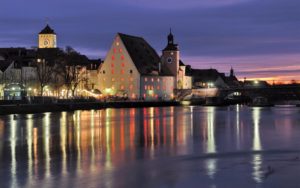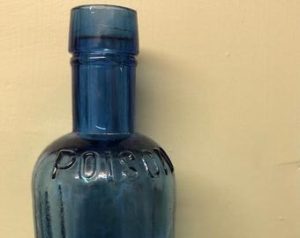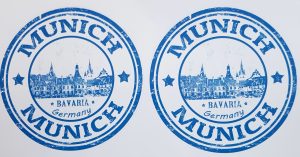Munich Nights Chapter 30: “The Brother Settles In And Quickly Makes An Impression”

When my father had mysteriously departed that foggy May morning the previous year, remarking casually to us, ‘that he was just going out and would be back soon with some much-needed kindling firewood,’ we sat and foolishly waited. But of course, he never returned to his family. My mother had then taken it as a mother’s or a wife’s mission upon herself to place herself at our old scratched warped door and always standing like a lonely weary sentry looking hopefully towards that uncharted forest, sadly at both approaching dawn and dusk. Then expecting rather foolishly to hear the unwelcomed approaching footsteps of our father returning in the morning or perhaps in the evening. But of course he thankfully never did return to us. Then after some weeks and after a village search by many of our neighbours, they returned with no news or any sightings of him. I was elated! My mother then stopped staging that daily duty and that redundant ritual. And both my sister and I gratefully never regretted her personal decision. He was, after all, a spiteful and selfish and many times brutal man. And I for one never mourned or even missed him and after a while, I never even thought about him. From my mind of cruel memories, he had now been painlessly removed. Thankfully from my life forever. Almost as if he has never ever existed. For me, it was a bitter victory for my suffering family.
The slightly dilapidated cottage next to my home was occupied by a middle-aged man whom we had always known simply as ‘Spade.’ He was, as I recall, an accomplished bricklayer working in the castle confines. And a fine traditional carpenter as well. He also doubled up as an important coffin builder for the castle lords when needed. But for the dead of our village, a simple white canvas shroud would be carefully placed around their deceased bodies before being taken for burial on the hill in a designated neglected area, chosen years ago by the duke himself as an act of kindness …. or so he wanted to foolishly convince himself. But never it seemed in the castle’s private burial ground for the villagers. Simply because when death suddenly arrived to claim any of the duke’s many extended family and friends, then a fine oak or elm wooden polished coffin would be ordered and prepared, and always silk lined and always finished to perfection to be later lowered by the castle servants and lowered in the vast ancient castle chapel crypt. Then later an extended castle wake/feast was quickly arranged and always enjoyed by all who participated in the feast. We in the village, of course, WERE never invited or included to this grand occasion by that privileged and greedy gentry.
Many times I remember climbing over that familiar brick wall behind the stables in those lost years of childhood that can never be reclaimed. I would then watch in awe with others from the village. The many parading lords and their ladies who would then arrive in all their flaunted splendour to attend the funeral and lavish celebrations after.
I remember watching those priests and their fawning acolytes performing their unknown rituals in an unknown language (I later discovered it was Latin). One corpulent man wearing splendid robes and wearing a ridiculous hat that somehow resembles a gawking fish’s head had somehow captured my attention. How strange I thought and I still do of what he was doing splashing so-called ‘holy water’ everywhere!
Then in my mother’s warm kitchen I surprisingly heard her ask the brother: “Are you hoping to stay long in our village?”
“For as long as it takes, dear lady,” he quickly replied.
“And how long will that be?” she asked rather confusedly.
“Until I am finished” he smiled inoffensively.
I would come to hear many times his swift and clipped answers and almost always answered with a riddle.
“May I ask sire where you hail from?” my mother genuinely asked. She was always very forward in what she said or asked anyone she did not know which in our village were very few for we had no visitors bringing either greetings or gifts.
“Where the bears are black as night and the flamingos are as white as snow” he immediately answered and accepted her kind offer of a welcomed lemon cordial refreshment. And his presence really did somehow lighten our humble abode then and in the future.
“And how should we address you sire?” asked my mother, placing herself close to my sister on the simple large bench.
“Certainly not as sire but simply as brother Jerome if you please” he replied savouring his drink as he peered at her closely, then seriously commented as he sipped his drink: “Do you suffer from an ongoing ailment in your neck and also in your hand perhaps?” Now peering closely at her!
“I only enquire because I noticed it seems to be giving you a great deal of pain and discomfort and especially when you turn around and raise your head …. am I right?”
My mother nodded rather sheepishly. He then stood up and walked over to her. “May I” he quietly asked as he held out his hand to examine her swollen neck. She nervously nodded her agreement. He then blew a stream of warm air onto his fingers, and then laid them gently upon her neck turning to me saying: “Rory, would you go to my lodging and bring me my small bag please.”
My mother looked rather surprised at what he had asked me to do. But I was very pleased to be a part of what he was expected to perform on my poor mother. I ran to the cottage, found that requested bag and took it back to him. He took it from me and reached inside to remove a small tube of paste and gently stroked its content upon her exposed neck saying: “What I am about to perform will cause you just splinter pain I’m afraid, then you will be free of all the discomfort it has caused you in the past” he said looking into her eyes. “Shall I begin?” he enquired gently.
Then without warning, he quickly twisted her neck and with this swift remedy suddenly freed her from her ongoing painful affliction that she had suffered for many years, and then he held her close to his chest. My mother had cried briefly in sharp pain and then shock. Then she manoeuvred her neck slowly around and smiled simply in gratitude because then all her previous discomfort had suddenly departed. My little sister gazed in wonder at what had been performed before her on our mother and I have to honestly admit so, did I. In truth, I was to observe so many times this given gift that the brother somehow possessed in relieving any long-lasting excruciating pain inflicted on so many people, especially in my own village!
We were a small agricultural community composed then of simple country folk basically just about surviving to care for the duke’s sheep and livestock and harvesting his harvest. Isolated always from an unknown world we really knew little about. I always enjoyed and looked forward to the spring lambing season and just to see them run and jump and frolic in the fields, and then to allow them to nestle safely my arms – if they let me – was always a wonderful almost spiritual feeling.
For some odd reason, the women in the village all wore a long french plait and always with an element of self-admiration.
This religious instruction may have been initiated years before when a young Lutheran minister usually visited our village twice a year for the usual pastoral ministry duties such as performing weddings and burials and other religious ceremonies. This odd gesture that all the women willingly complied to was perhaps a necessary religious requirement of the minister’s own practised religion. I really never found out. But it had been many years since any minister of his denomination had visited or reached our village when the brother had arrived unexpectedly and without warning.
Then the brother asked my grateful mother if I could return with him to the cottage to help unpack his many shoulder bags. He was obviously hoping to sojourn with us for a long period but for how long I didn’t know.
Looking back many years later at the vast array of fascinating unpacked items that he proudly displayed before me it somehow resembled an amazing chemist’s apothecary shop that I was to witness later in a Berlin suburb specialising in aiding peoples ugly and noticeable disabilities.
I was also in awe of seeing over fifty or so small coloured bottles with those unusual glass stoppers. All now filled with some cloudy and some opaque liquid. And just as many small lidded pots of creams that were also on display. As he unpacked them from their straw wrappings and very carefully situated them with care onto a large vacant shelf some I noticed had the dangerous word ‘POISON’ written on the label. “Always keep away from them” he warned me. Some could if used correctly be used with an antidote to be used as an anaesthetic or so he claimed to me but only in safe hands.

These would be the well worn assorted instruments of his unusual trade that I had never seen before and never tired of watching their display in his healing hands.
To the brother the art of practising medicine was also to protect life, never to assist in bringing an unwanted death to a weakened patient.
“Life is very brief Rory. Never waste or squander it. Death when it arrives will last forever and beyond that cold grave. Never misuse time either. It is a rare gift from God that can never be claimed back … or as the Holy Bible states in the little book of James: “For what is your life? It is even a vapour, that appeareth for a little time, and then vanisheth away.”
I found those words very inspiring then and still do even today. And of course, I did not know or understand the medical usage or understand their unusual names on the bottles. Why would I? So I always watched with great interest as they were carefully situated on an empty workbench under our exposed window with no glass such items as A Mortar & Pestle. Wooden tongs, syringes, weighing scales, test tube racks, glass funnels. With other strange-looking apparatus that he would use frequently in his experiments. And watched him intently working sometimes furiously. His many prized different sized coloured handwritten notebooks were also on display on his overcrowded workbench for reference. And he would consult them frequently often by candlelight. Many written in spider-like handwriting that only he could decipher.
Over the next few days, many of our villagers were waiting outside his door usually from early morning hoping if possible for much-needed relief from their many bodily ailments. He always graciously obliged many of the folk over the next few days, asking them later to report to him if possible with any noticeable health improvement. Obviously, word had got around very quickly concerning my mother and her long-suffering ailment with her neck.
Those he could be of help to were treated all with equanimity. Those he sadly was unable to treat were gently informed he could offer no hope. He would later inform them always quietly to come back to him when the pain became too much to bear.
Then one wet morning he surprisingly took me aside and sat me down. Then said in his warm voice that I was happily getting to welcome almost daily: “Well young Rory, I think it’s time for your very first lesson in learning, and then reading and understanding something we now call the alphabet and numbers.”
He then produced two large black quarry slates from his desktop and two pieces of white chalk. He gave me one board saying patiently: “Now try and copy what I do.”
I was about to begin a wonderful adventure.
To be continued…..

(C) Copyright G. Patrick Battell
October 2020